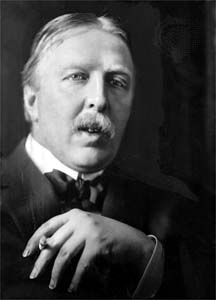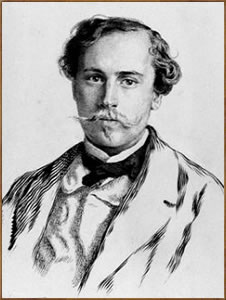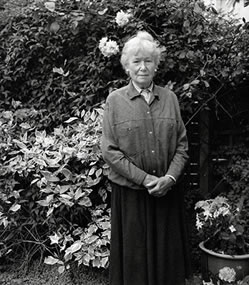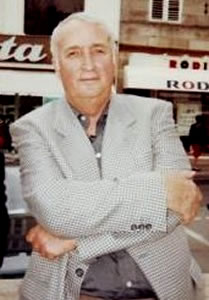De Engelse dichter, schrijver en publicist Ford Madox Ford werd geboren op 17 december 1873 in Merton, Surrey. Zie ook alle tags voor Ford Madox Ford op dit blog.
Uit: The Good Soldier
“Captain Ashburnham also had a heart. But, whereas a yearly month or so at Nauheim tuned him up to exactly the right pitch for the rest of the twelvemonth, the two months or so were only just enough to keep poor Florence alive from year to year. The reason for his heart was, approximately, polo, or too much hard sportsmanship in his youth. The reason for poor Florence’s broken years was a storm at sea upon our first crossing to Europe, and the immediate reasons for our imprisonment in that continent were doctor’s orders. They said that even the short Channel crossing might well kill the poor thing.
When we all first met, Captain Ashburnham, home on sick leave from an India to which he was never to return, was thirty-three; Mrs Ashburnham Leonora –was thirty-one. I was thirty-six and poor Florence thirty. Thus today Florence would have been thirty-nine and Captain Ashburnham forty-two; whereas I am forty-five and Leonora forty. You will perceive, therefore, that our friendship has been a young-middle-aged affair, since we were all of us of quite quiet dispositions, the Ashburnhams being more particularly what in England it is the custom to call “quite good people”.
They were descended, as you will probably expect, from the Ashburnham who accompanied Charles I to the scaffold, and, as you must also expect with this class of English people, you would never have noticed it. Mrs Ashburnham was a Powys; Florence was a Hurlbird of Stamford, Connecticut, where, as you know, they are more old-fashioned than even the inhabitants of Cranford, England, could have been. I myself am a Dowell of Philadelphia, Pa., where, it is historically true, there are more old English families than you would find in any six English counties taken together. I carry about with me, indeed–as if it were the only thing that invisibly anchored me to any spot upon the globe–the title
deeds of my farm, which once covered several blocks between Chestnut and Walnut Streets.”

Ford Madox Ford (17 december 1873 – 26 juni 1939)
De Franse schrijver Jules de Goncourt werd geboren op 17 december 1830 in Parijs. Zie ook alle tags voor Jules de Goncourt op dit blog.
Uit: Germinie Lacerteux (Door Jules en Edouard de Goncourt)
« La fosse commune, ce jour-là, c’était cela. Ce terrain, ces croix, ce prêtre disaient : – Ici dort la Mort du peuple et le Néant du pauvre.
O Paris ! tu es le cœur du monde, tu es la grande ville humaine, la grande ville charitable et fraternelle ! Tu as des douceurs d’esprit, de vieilles miséricordes de mœurs, des spectacles qui font l’aumône ! Le pauvre est ton citoyen comme le riche. Tes églises parlent de Jésus-Christ ; tes lois parlent d’égalité ; tes journaux parlent de progrès ; tous tes gouvernements parlent de peuple ; et voilà où tu jettes ceux qui ont sué leur vie à travailler pour toi, à te donner ton bien-être, tes plaisirs, tes splendeurs, ceux qui ont fait ton animation, ton bruit, ceux qui ont mis la chaîne de leurs existences dans ta durée de capitale, ceux qui ont été la foule de tes rues et le peuple de ta grandeur ! Chacun de tes cimetières a un pareil coin honteux, caché entre un bout de mur, où tu te dépêches de les enfouir, et où tu leur jettes la terre à pelletées si avares que l’on voit passer les pieds de leurs bières ! On dirait que ta charité s’arrête à leur dernier soupir, que ton seul gratis est le lit où l’on souffre, et que, passé l’hôpital, toi si énorme et si superbe, tu n’as plus de place pour ces gens-là ! Tu les entasses, tu les presses, tu les mêles dans la mort, comme il y a cent ans, sous les draps de tes Hôtels-Dieu, tu les mêlais dans l’agonie ! Encore hier, n’avais-tu pas seulement ce prêtre en faction pour jeter un peu d’eau bénite banale à tout venant : pas la moindre prière ! Cette décence même manquait : Dieu ne se dérangeait pas ! Mais ce que ce prêtre bénit, c’est toujours la même chose : un trou où le sapin se cogne, où les morts ne sont pas chez eux ! Le corruption y est commune ; personne n’a la sienne, chacun a celle de tous : c’est la promiscuité du ver ! Dans le sol dévorant, un Montfaucon se hâte pour les Catacombes…“

Jules de Goncourt (17 december 1830 – 20 juni 1870)
De Engelse dichteres, schrijfster en essayiste Penelope Fitzgerald werd geboren op 17 december 1916 in Lincoln. Zie ook alle tags voor Penelope Fitzgerald op dit blog.
Uit: The Means of Escape
„St. george’s church, Hobart, stands high above Battery Point and the harbor. Inside, it looks strange and must always have done so, although (at the time I’m speaking of) it didn’t have the blue-, pink- and yellow-patterned stained glass that you see there now. That was ordered from a German firm in 1875. But St. George’s has always had the sarcophagus-shaped windows, which the architect had thought Egyptian and therefore appropriate (St. George is said to have been an Egyptian saint). They give you the curious impression, as you cross the threshold, of entering a tomb.
In 1852, before the organ was installed, the church used to face east, and music was provided by a seraphine. The seraphine was built, and indeed invented, by a Mr. Ellard, formerly of Dublin, now a resident of Hobart. He intended it to suggest the angelic choir, although the singing voices at his disposal — the surveyor general, the naval chaplain, the harbormaster and their staffs — were for the most part male. Who was able to play the seraphine? Only, at first, Mr. Ellard’s daughter, Mrs. Logan, who seems to have got L20 a year for doing so, the same fee as the clerk and the sexton. When Mrs. Logan began to feel the task was too much for her — the seraphine needs continuous pumping — she instructed Alice Godley, the rector’s daughter.
Hobart stands “south of no north,” between snowy Mount Wellington and the River Derwent, running down over steps and promontories to the harbor’s bitterly cold water. You get all the winds that blow. The next stop to the south is the limit of the Antarctic drift ice. When Alice went up to practice the hymns she had to unlock the outer storm door, made of Huon pine, and the inner door, also a storm door, and drag them shut again.“

Penelope Fitzgerald (17 december 1916 – 28 april 2000)
De Franse schrijver Alphonse Boudard werd geboren op 17 december 1925 in Parijs. Zie ook alle tags voor Alphonse Boudard op dit blog.
Uit: L’Hôpital
«… les pavés ronds, les arcades, je traverse la cour, j’entre à l’hosto. C’est l’été et c’est Bicêtre. Ils partent les autres au bronzage sur les rives d’Azur. Qu’ils se tirent tous, grand bien leur fasse… mémères, lardons, pin-up… Nationale 7… Saint-Trop les miches ! Tellement je suis pompé, crouni, qu’ils peuvent se gaver tous les soleils, ça ne me démange pas la jalousie. J’ai la tête lourde, les cannes tristes et encore ce goût fade de sang dans le fond de la gorge. Je me pointe tout sage aux admissions, bien docile, bien réfléchi. J’ai ma valoche carton bouilli, ma brosse à dents, mon nécessaire, juste ce qu’il me faut. La canicule, le ciel d’ardoise, l’étouffement que c’est !… chez Géo, l’usine en bas vers la Bascule, les effluves qui montent à vous dégoûter de la saucisse pour le restant de vos repas. Je retire mes pompes. La préposée, la dame en blanc, toujours l’exige. Trop souvent qu’elle en a vus, depuis vingt piges et des poussières qu’elle officie à l’Assistance, de ces messieurs bien sous tous rapports – le col à becter de la tarte, les manchettes à boutons dorés – et cependant les panards cradingues puants. Elle se défie des apparences, elle connaît la vie, les êtres, les plaies profondes, le cœur humain. […]»

Alphonse Boudard (17 december 1925 – 14 januari 2000)
De Braziliaanse schrijver Érico Veríssimo werd geboren op 17 december 1905 in Rio Grande do Sul. Zie ook alle tags voor Érico Veríssimo op dit blog.
Uit: Mexico (Vertaald door Linton Barrett)
„The legendary Rio Grande, that part of it where we crossed and at that season of the year, was no more than a slender thread of water running melancholy along its bed of burnished copper.
“The dry season,” the ticket-collector, a short man with a sharp Aztec profile, explains laconically.
Our train–two cars with extremely few passengers–was being hauled by an elderly locomotive, slow and wheezy.
“You see,” I murmured to my companion, “nobody in his right mind makes this trip by train.”
“The crazy ones go by air,” she smiled. “So far I have no reason for complaining.”
The examination of passports was rapid. The American inspector was blond, lean and jovial. The Mexican, fat, hairy and taciturn. We had no trouble with Customs: at sight of my laissez-passer with
the seal of the Organization of American States they desisted from inspecting our bags. We slowly entered the territory of Mexico.
Under the light that falls from a faded sky, a metallic tone, this part of Juárez next to the railway station reminds us of a city of the Brazilian Northeast, with its low houses, some painted yellow, blue
or pink, the sandy ground and the dry air of a glittering transparency. Barefoot Indian men and women, standing in the streets, raise their enigmatic, earth-coloured faces toward the train. They are stumpy, ugly, dirty and sorry-looking. I see men dressed in a fetal position, their straw hats tilted over their eyes, just as in the most conventional pictures that claim to represent Mexico. Boys in blue jeans of visibly Texan influence are playing baseball in a field. The towers of an old church loom above a clump of trees, sharp against the May horizon. I am gradually being invaded by that sensation which, in certain places we visit for the first time or in certain situations, leads us to think: “I’ve been here before. This has already happened to me.”

Érico Veríssimo (17 december 1905 – 28 november 1975)
